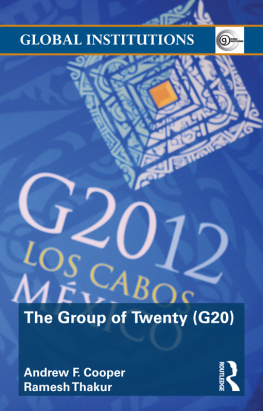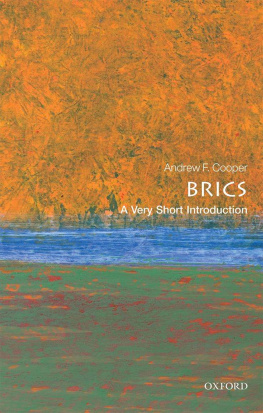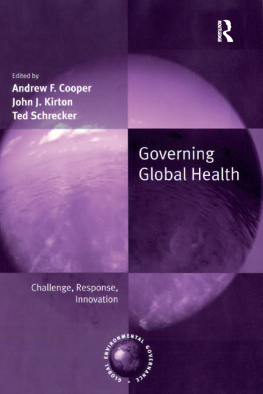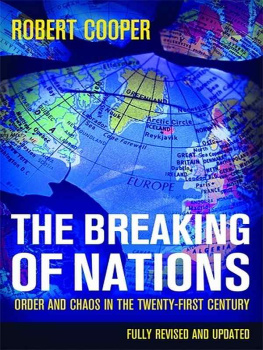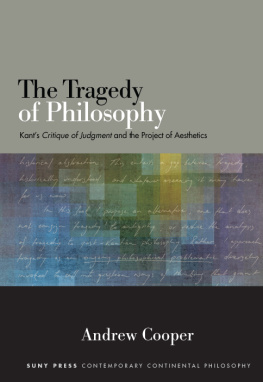The Group of Twenty (G20)
This work offers a concise examination of the purpose, function and practice of the Group of Twenty (G20) summit. Providing a comprehensive historical account of the G20 finance ministers and central bank governors process, the text then moves on to outline the conditions, events and debates that led to the formation of the permanent, expanded leaders-level forum. The historical span of the G20 Summit process is not long, but the global transformations that precipitated it are crucial when seeking to understand it.
Cooper and Thakur explore a variety of major debates, including:
- Governance by self-selected groups versus mandated multilateral organizations;
- The legitimacy of informal leadership;
- The issue of the G20s composition of both solution countries and problem countries;
- The role of the emerging powers; and
- New conceptions of NorthSouth relationships.
This work offers a detailed examination of the ongoing shifts in economic power and the momentum toward global institutional reform, illustrating how the G20 has moved from a crisis committee to the premier global forum over this short but intense history, and mapping out its comparative advantages and key challenges ahead.
Andrew F. Cooper is Professor, Department of Political Science, and Director of the Centre for Studies on Rapid Global Change, University of Waterloo. Holding a DPhil from the University of Oxford, he was a Fulbright Research Chair in Public Diplomacy at the University of Southern California in 2009.
Ramesh Thakur is Professor of International Relations and Director of the Centre for Nuclear Non-proliferation and Disarmament at the Australian National University, and adjunct professor in the Institute of Ethics, Governance and Law at Griffith University.
Routledge Global Institutions Series
Edited by Thomas G. Weiss
The CUNY Graduate Center, New York, USA and Rorden Wilkinson
University of Manchester, UK
About the series
The Global Institutions Series has two streams. Those with blue covers offer comprehensive, accessible, and informative guides to the history, structure, and activities of key international organizations, and introductions to topics of key importance in contemporary global governance. Recognized experts use a similar structure to address the general purpose and rationale for specific organizations along with historical developments, membership, structure, decision-making procedures, key functions, and an annotated bibliography and guide to electronic sources. Those with red covers consist of research monographs and edited collections that advance knowledge about one aspect of global governance; they reflect a wide variety of intellectual orientations, theoretical persuasions, and methodological approaches. Together the two streams provide a coherent and complementary portrait of the problems, prospects, and possibilities confronting global institutions today.
The most recent related titles in the series include:
The Organisation for Economic Co-operation and Development (2009)
by Richard Woodward
Institutions of the Global South (2009)
by Jacqueline Anne Braveboy-Wagner
The European Union (2008)
by Clive Archer
The World Economic Forum (2007)
by Geoffrey Allen Pigman
The Group of 7/8 (2007)
by Hugo Dobson
The Group of Twenty (G20)
Andrew F. Cooper and Ramesh Thakur
First published 2013
by Routledge
2 Park Square, Milton Park, Abingdon, Oxon OX14 4RN
Simultaneously published in the USA and Canada by Routledge
711 Third Avenue, New York, NY 10017
Routledge is an imprint of the Taylor & Francis Group, an informa business
2013 Andrew F. Cooper and Ramesh Thakur
The right of Andrew F. Cooper and Ramesh Thakur to be identified as author of this work has been asserted by them in accordance with the Copyright, Designs and Patent Act 1988.
All rights reserved. No part of this book may be reprinted or reproduced or utilised in any form or by any electronic, mechanical, or other means, now known or hereafter invented, including photocopying and recording, or in any information storage or retrieval system, without permission in writing from the publishers.
Trademark notice: Product or corporate names may be trademarks or registered trademarks, and are used only for identification and explanation without intent to infringe.
British Library Cataloguing in Publication Data
A catalogue record for this book is available from the British Library
Library of Congress Cataloging in Publication Data
Cooper, Andrew Fenton, 1950
The Group of Twenty (G20) / Andrew F. Cooper & Ramesh Thakur.
p. cm. (Routledge global institutions series; 73)
Includes bibliographical references and index.
1. Group of Twenty. 2. International economic relations. I. Thakur, Ramesh Chandra, 1948- II. Title.
HF1359.C693 2013
337.1dc23
2012028788
ISBN: 978-0-415-78088-9 (hbk)
ISBN: 978-0-415-78089-6 (pbk)
ISBN: 978-0-203-07123-6 (ebk)
Contents
Tables
Foreword
The Right Honourable Paul Martin
Former Prime Minister of Canada
This is a very good book; and so it should be, for its authors were both witnesses and participants in the evolution of the G20 from the beginning. That they have produced such an accessible overview despite their wealth of knowledge which so often renders unreadable efforts of this kind makes it even more important. What adds to its quality is that Cooper and Thakur do not hesitate to express their opinions, and while not all of the latter should go unchallenged those who would do so had better be well prepared.
The authors have collaborated on several inter-related projects dealing with the changes to multilateral global governance and the role of ideas in shaping the diplomatic landscape. Their joint efforts span the years from Thakurs leadership position at the United Nations University to Coopers numerous writings; from being colleagues at the University of Waterloo to Thakurs new position at the Australian National University. As this book shows, they bring a formidable combination of complementary skills to telling the story of potentially one of the most critical innovations in the machinery of global governance.
Bringing a new institution into being is not easycertainly not one seeking to represent not just the global powers but the regional economic powers as well. This was indeed true of the grouping of finance ministers and central bank governors that became known as the G20 finance ministers despite the fact that there were only 19 countries involved.
The first attempt was made during the Mexican Peso Crisis in the mid-1990s. However, it was only during the Asian debacle later in the decade when the countries at the root of the crisis made it clear to the G7 that they were not interested in the advice of a body so unrepresentative of their reality that the breakthrough occurred.
When years later, as prime minister I approached my counterparts to lay the groundwork for a Leaders 20, I used the same logic and indeed I continued to do so after leaving office. My argument was strengthened even more by the ever deepening integration of globalization and the consequent threat of contagion in all of its aspects. The need for a more effective crisis responder and a more prescient steering committee was evident, and I would point out that there was no need to reinvent the wheelall they had to do was follow the precedent established by their own countries a decade earlier.


